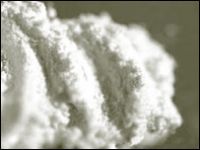Bacteria could tackle cocaine addiction
 |
For those of you following the story on a potential cocaine vaccine, we have another contender entering the ring:
The naturally-occurring bacterial enzyme Cocaine esterase, CocE, breaks down cocaine which reduced its addictive properties.
The discovery has been hailed as possible method of helping addicts get off the drug and could prevent deaths from overdose.
Scientists found the bacteria was only active in the body for a short while but a more stable version double mutant bacterial version known as DM CocE was more effective.
In the scientific trials on the ensyme, rats were trained to self-administer cocaine by pressing a button in their cage, mimicking the need for regular doses of the drug during addiction.
Rats treated with the double mutant form of CocE pressed the button to receive cocaine less often, suggesting that DM-CocE broke down the drug and dampened addiction.
Professor Friedbert Weiss, of The Scripps Research Institute which conducted the study, said: "These therapeutic approaches may therefore not be 'fail-safe' for reducing cocaine intake by determined users but long-acting forms of CocE represent potentially valuable treatment approaches not only for the prevention of cocaine-induced toxicity but also for ongoing cocaine abuse in humans."
The findings were published in the Journal of Pharmacology and Experimental Therapeutics.
|

Recently @ DoseNation
|
|






















The comments posted here do not reflect the views of the owners of this site.